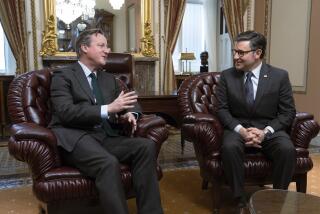Gordon Brown hangs hopes on visit to Obama
- Share via
LONDON — Months ago, British Prime Minister Gordon Brown was promoted by admirers as the man to save the world from economic catastrophe.
Now he has his hands full just trying to save his own job.
Brown has come to Washington this week as head of a government saddled with economic indicators in free fall and poll numbers to match. Whether he can stop the rot with reflected glory from a president who enjoys rock-star status on this side of the Atlantic remains to be seen.
In meetings today with President Obama, Brown is expected to push the outlines of a plan for what he is calling a “global new deal,” a mix of stimulus spending and common regulations for the international financial system. He will make his case Wednesday for the U.S. and Britain to lead this new economic order in a rare speech by a foreign leader to a joint session of Congress.
The trip has been billed by many at home as one of Brown’s last chances to rescue his government. His troubles run deep. The bank rescue plan he unveiled last fall, which won Labor a temporary boost in the polls, hasn’t worked.
The bailout went further than American plans by recapitalizing some of Britain’s biggest banks, but those banks are still refusing to lend to one another and to the public. Brown’s government has had to cough up more bailout money, enough to make it now the majority shareholder in the Royal Bank of Scotland, once the world’s fifth-largest in market capitalization.
Some critics accuse Brown of trying to take his Labor government back to the party’s socialist roots. He has also taken flak for allowing former Royal Bank of Scotland Chief Executive Fred Goodwin to walk away with a nearly $1-million annual pension.
Even the prime minister’s response to that political fiasco -- a pledge to try to prevent Goodwin from claiming any of the pension when there appear to be no legal means to do so -- has divided his party and triggered accusations that he was resorting to cheap populism.
The attacks on Brown have not been only domestic. Over the weekend, French President Nicolas Sarkozy lashed back at criticism he had resorted to protectionism when he offered government aid to carmakers to keep their plants in France.
“Take my friend Gordon Brown -- and you know how much I trust him -- who owns 70% of a bank,” Sarkozy said. “Seventy percent! It’s nationalization. So explain where is the logic in saying there’s no problem when a state takes 70% of a bank, but helping manufacturers to get credit -- that is a problem.”
It is Brown, not Sarkozy, who will be the first European leader welcomed to the Obama White House. Both Brown and Obama say that the way out of the current economic mess involves deficit spending, some of it aimed at technologies to limit their countries’ dependency on carbon-based fuels.
But Obama is likely to be cautious about embracing Brown’s enthusiasm for coordinating fiscal policy, or overhauling global bodies such as the International Monetary Fund. And in age and charm Obama actually has more in common with Conservative Party leader David Cameron, the man who wants the 58-year-old Brown’s job and, if current polls hold, is likely to get it.
Furthermore, whereas Obama’s economic mess was inherited, the seeds of the British meltdown were sown on Brown’s watch, first as Britain’s longest-serving finance minister, under Tony Blair, then as prime minister. That creates a 12-year record for opponents to attack.
They gleefully point out that the speculative fever among banks, the housing bubble, the proliferation of abstruse financial instruments few people knew existed and even fewer seem to have understood were all created under Labor.
In June 2007, in words that haunt him, from one of his final speeches as finance minister, Brown congratulated London’s bankers and financiers on their “ingenuity and creativity,” which had ushered in “an era that history will record as the beginning of a new golden age.”
History, unfortunately, has already recorded it as the beginning of something else.
--
More to Read
Sign up for Essential California
The most important California stories and recommendations in your inbox every morning.
You may occasionally receive promotional content from the Los Angeles Times.











